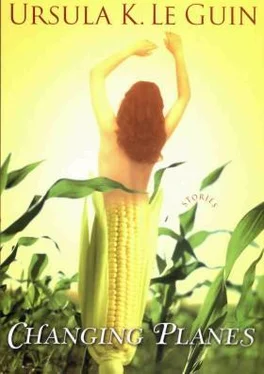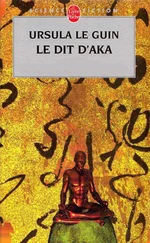It was then that I discovered the other subject of conversation in Hegn—the topic that could eclipse sports, gorkis, the weather, and even consanguinity.
The Tuggs and the Gats, of whom there were nineteen or twenty at that time, were of inexhaustible, absorbing interest to the royalty of Hemgogn. Children made scrapbooks about them. The Viscount’s mother had a cherished mug and plate bearing portraits of “Mother” and “Dad” Gat on their wedding day, surrounded by gilt scrolls. Rather amateurish mimeographed reports of the Common Family’s doings and snapshots of them made by the royals of Hemgogn were enormously popular not only throughout the kingdom but also in the neighboring kingdoms of Drohe and Vigmards, neither of which had a family of commoners. The larger neighboring reign to the south, Odboy, had three common families and an actual, living wastrel, called the Old Tramp of Odboy. Yet even there, gossip about the Gats, how short Chickie’s skirts were, how long Mother Tugg seethed her underwear, whether Uncle Agby had a tumor or only a boil, whether Auntie and Uncle Bod were going to the seashore for a week in summer or an excursion to the Vigmards Hills in autumn—all this was discussed almost as eagerly in Odboy as in the commonerless kingdoms or Hem-gogn itself. And a portrait of Sissie wearing a crown of wild-flowers, made from a snapshot that was said to have been taken by Prince Frodig, though Chickie insisted that she had taken it, adorned the walls of a thousand rooms in a dozen palaces.
I met a few royals who did not share the general adoration. Old Prince Foford took rather a liking to me, foreigner as I was. The King’s first cousin and my friend the Duke’s uncle, he prided himself on his unconventionality, his radical thinking. “Rebel of the Family, they call me,” he said in his growly voice, his eyes twinkling among wrinkles. He raised flennis, not gorkis, and had no patience at all with the Commoners, not even Sissie. “Weak,” he growled, “no stamina. No breeding. Flaunted herself about under the walls, hoping the Prince’d see her. Caught cold, died of it. Whole lot of ’em sickly. Sickly, ignorant beggars. Filthy houses. Put on a show, that’s all they know how to do. Dirt, screeching, flinging pots, black eyes, foul language—all show. All humbug. Couple of dukes in that woodpile, back a generation or two. Know it for a fact.”
And indeed, as I took notice of the gossip, the bulletins, the photographs, and of the Commoners themselves as they went about the streets of Legners Royal, they did seem rather insistently, even blatantly lower-class: professional is perhaps the term I want. No doubt Chickie had not deliberately planned to be impregnated by her uncle, but when she was, she certainly made the most of it. She would tell any prince or princess with a notebook the woeful tale of how Uncle Tugg had squashed half-rotted grapes into her mouth till she was vomiting drunk and then tore off her clothes and screwed her. The story grew with the telling, getting more and more steamy and explicit. It was the thirteen-year-old Prince Hodo who wrote down Chickie’s vivid words concerning the brutal weight of Uncle Tugg’s hairy body and how even as she fought him her own body betrayed her, her nipples hardening and her thighs parting as he forced his, and here the prince put four asterisks, into her four asterisks. To one of the younger duchesses Chickie confessed that she had tried to get rid of the baby but hot baths were a bunch of crap and Grandma’s herbs were a load of shit and you could kill yourself with knitting needles. Meanwhile Uncle Tugg went around boasting that the family had always called him Fuckemall, until his brother-in-law, Chickie’s putative father (there was a good deal of doubt concerning Chickie’s parentage, and Uncle Tugg himself may have been her father) lay in wait for him, attacked him from behind with a piece of lead pipe, and beat him senseless. The entire kingdom shuddered voluptuously when Uncle Tugg was discovered lying in a pool of blood and urine at the door of the family outhouse.
For the Gats and Tuggs had no plumbing, no running water, no electricity. The previous queen, in a misplaced fit of compassion or noblesse oblige, had had wiring installed in the main house of the ancient, filthy warren of hovels and sheds called the Commons, where snot-nosed urchins played in gutted automobiles and huge dogs lunged on short chains in endless frenzies of barking, trying to attack Great-Aunt Yoly’s mangy sheep that wandered about among the stinking vats of Uncle Agby’s tannery. The boys broke all the lightbulbs with their slingshots the first day. Gamma Gat would never use the electric oven, preferring to roast her breadfruit in the cavernous woodstove. Mice and rats ate the insulation and shorted out the circuits. The principal result of the electrification of the Commons was a lingering stink of fried rat.
As a rule the Commoners avoided foreigners with blank inattention, just as the royals did. Now and then their patriotic bigotry boiled up and they threw garbage at tourists. Informed of this, the Palace always issued a brief statement of shock and dismay that Hegnishmen should so forget the hospitable traditions of the kingdom. But at the royal parties there was often a little satisfied sniggering and murmurs of “Gave the beggars a bit of daeir own, eh?” For after all, tourists were commoners; but they weren’t our commoners.
Our commoners had picked up one foreign habit. They all smoked American cigarettes from the age of six or seven, and had yellow fingers, bad breath, and horrible phlegmy coughs. Cousin Cadge, one of the fat, pale men I had seen at the funeral, ran a profitable cigarette-smuggling business through his dwarfish son Stumpy, who was employed to clean toilets at the Interplanary Hotel. Young royals often bought cigarettes from Cadge and smoked them in secret, relishing the nausea, the nastiness, the sense of being for a few minutes real vulgarians, genuine scum.
I left before Chickie’s baby was born, but royal attention was already centered on the coming event, and was only heightened by Chickie’s frequent public announcements that she was sure the little bastard would be a drooling idiot born without any arms or legs or four asterisks, what else could you expect.
And the royal families of four kingdoms did not want to expect anything else. Fascinated, appalled, they looked forward to a genetic disaster, a tiny, monstrous plebeian to cluck and sigh and shudder over. I am sure Chickie did her duty and provided them one.
WOEFUL TALES FROM MAHIGUL
WHEN I’M IN MAHIGUL, a peaceful place nowadays though it has a bloody history, I spend most of my time at the Imperial Library. Many would consider this a dull thing to do when on another plane, or indeed anywhere; but I, like Borges, think of heaven as something very like a library.
Most of the Library of Mahigul is outdoors. The archives, bookstacks, electronic storage units, and computers for the leg-emats are all housed underground in vaults where temperature and humidity can be controlled, but above this vast complex rise airy arcades forming walks and shelters around many plots and squares and parklands—the Reading Gardens of the Library. Some are paved courtyards, orderly and secluded, like a cloister. Others are broad parks with dells and little hills, groves of trees, open lawns, and grassy glades sheltered by hedges of flowering shrubs. All are very quiet. They’re never crowded; one can talk with a friend, or have a group discussion; there’s usually a poet shouting away somewhere on the grounds, but there’s perfect solitude for those who want it. The courtyards and patios always have a fountain, sometimes a silent, welling pool, sometimes a series of bowls, the water cascading from basin to basin. Through the larger parks wind the many branches of a clear stream, with little falls here and there. You always hear the sound of water. Unobtrusive, comfortable seats are provided, light chairs that can be moved, some of them legless, just a frame with a canvas seat and back, so you can sit right on the short green turf but have your back supported while you read; and there are chairs and tables and chaise longues in the shade of the trees and under the arcades. All these seats are provided with outlets into which you can connect your legemat.
Читать дальше









